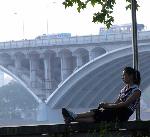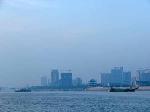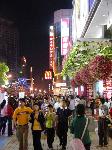- Getting around Lijiang. Dont stay in the Old Towns more than 2 days, there is nothing to do. KRISS Oct 9, 2013 05:46
- 2013 Beijing Temple Fair BENNYLAU Feb 26, 2013 03:29
- Malaysian traveling from KUL - LAX vis Shanghai PVG ZATI_DY Jan 3, 2013 20:15
On the First of May
- Views: 4518
- |Vote: 0 0
- |Add to Favorites
- |Recommend to Friends
Wuyi Jie on Wuyi Lu
The first week of May is one of China's three most important week-long holidays, and is set aside for the observance of the international Labour Day. China's a socialist country, and as such recognises the role of the worker as central to society. China therefore makes a big deal of this festival, and celebrates it with great fervour. Visitors will notice that almost every major city in China will have a street or public square named after the holiday ('wuyi' in Chinese), and the city of Changsha, capital of Hunan province, is no exception. Changsha's Wuyi Road is the city's most famous stretch, reaching all the way across the city from the railway station in the east to the massive Orange Island Bridge in the west. It seemed to ideal place to be for welcoming in the first day of the festival.
Right at the western end of the street lies what is undoubtedly the city's most well-developed district, situated on the junction of Wuyi Road and Huangxing Road. Wuyi Square, on the corner, is a spacious public park area where Changsha's more fashionable crowds pause for shopping breaks in the open air when the weather is cool out - and the May holiday is when the city really starts to feel the summer swelter, so May Day was an ideal time to see locals enjoying the first glorious heat of the year in shorts and skirts.
Changsha, however, isn't all fashion and shopping - quite the opposite, in fact - and a few streets down, Changsha begins to look again like a small provincial Chinese town. It's thoroughly South China, the precisely placed clutter of black tiles on the roofs of brick and soft, grey, mossy stone homes, the walls crawling with ivy. I followed the bustle down a side alley - Xichang Street - and found myself in the middle of a busy marketplace where vegetables are sold from small tables and street blankets, and meat is hacked off the animal for demanding customers. Right near the main street, vendors were busy slicing live snakes, stripping out the backbone with expert fingers (although not entirely so - I saw one over-confident handler struck by one of the doomed reptiles - which bought it more life as it was hurriedly pressed back into the cage) and twisting the pink meat into bags, thrusting the paper notes into their shirt pockets with bloodied fingers. On a nearby stair lay fifty-odd tortoise shells, strands of pink flesh hanging still to the hollow where the animal had been scooped out and sold.
Fascinating as the market was, the next street was far more appealing. Xiangjiang Road is the boulevard that meanders along the river bank, and passing under the first arch of the bridge that descends into Wuyi Road took me right there. Under the shady trees, more leisure-loving locals sat at squat stone tables, playing cards, smoking cigarettes, and chatting boisterously. Beyond them, the cool air over the river swelled in the city haze, casting Changsha and the island in the middle of the Xiang River - a long bar from which the city derives its name - in a white soft focus.
Sleeping on the Xiang
A trip to Changsha isn't complete without a good look at the river that is often invoked to refer to the whole of Hunan province - the Xiang. One of the great tributaries of the Yangtze river, the Xiang writhes throughout the province and curves gently into Changsha, where the Liuyang River runs off into the north of the town.
Wandering along Xiangjiang Road provides some very satisfying views of the Xiang, as I found passing amongst the gathering townsfolk who were relaxing there, some with two-stringed Chinese violins (erhu) working rich melodies into the river air.
Looking down from the roadside to the shore, I saw several old passenger boats pulled up on the sand, and so decided to see if I could take a ride on the river. An old gentleman led me to his vessel - also carrying a few tourists from Canton - and my feeble bartering skills saw me adrift at the cost of ten yuan.
It was a warm mid-noon, and I was immediately put in a drowsy mood as we floated out into the Xiang. It sat placid and warm on that day - quite different from the mood in which I'd last seen this river on a previous visit to the city, when floodwaters had almost completely submerged Orange Island and was in danger of breaking the banks on the city side too. Now, massive holding walls were being constructed around the entire periphery of the island, perhaps an overdue measure considering the amount of reconstruction work that has been invested into the old foreign-built mansions dating back from concession days there - but not a project that was giving the island an attractive look. I've always found Orange Island to be a very pleasant promenade with tropical-looking scenery; now, with flat concrete walls almost completely surrounding the island, some of that magic had been sacrificed.
Under this old boat, I could feel the force of the river water beneath me, a reminder that great rivers like this one are terrible creatures. The water passing beneath me had travelled halfway across China, collecting the trickling energy of droplets seeping through Chinese soil into the flow, and the whole propelled together into a mass of hydraulic strength pressing ahead without hesitation. Watching the Xiang course ahead along the Changsha banks, I couldn't help thinking of the way people have swelled their ranks into this province in rather the same way. Hunan is one of the most heavily populated areas in the whole country, and As I closed my eyes I could almost feel the incontrovertible force of man after man sweeping into each room of each building that seemed to spring up from the sides of the Xiang.
The boat swept around the southern tip of Orange Island - where pretty pavillions have been set as lookouts over the river and the ever-developing cityscape. I drifted in and out of sleep, and saw Chinese people stepping out from the river like phantoms and drift into the currents of Wuyi Road.
Huangxing Pedestrian Mall
I did the same myself, come evening - because the city seemed to be awakening too and the developed areas around Wuyi and Huangxing Roads seemed to be filling fast with excited pedestrians. As the neon lights flickered into life one after the other, the whole street took on a very different character.
The familiar golden arches of the McDonald's logo is a good indicator of prime commercial real estate, and in this stretch there are no less than three McDonald's stores within about two kilometres. A few KFCs, a couple of RBTs, and about every other well-known fast food chain that operates in China has a presence on the street.
For the hungry, these are not the only choices for filling the gap. Lining the street are a host of roadside vendors selling snacks at around the one yuan mark each. Some I was quite familiar with - watermelons were sold whole or scooped into bite-sized balls, egg cakes, pineapple quarters skewered on chopsticks, and candy floss. Others I wasn't - one fruit resembled a chestnut, but after the dark brown skin was peeled away, the inside was a hard, snow-white nugget that tasted like a crisp melon. One of the least appealing looking, but popular locally, was a dish of soup called 'niu za' - spooned out from a large metal canister heated by coals underneath, it seemed to be a mere concoction of random strips of beef - from any part of the animal - dropped into the liquid.
Near the southern end of Huangxing Road, the street is sectioned away from traffic and becomes a busy pedestrian mall. A great statue of the figure after whom the street takes its name - Huang Xing himself - stands imposingly at the entrance. This has to be Changsha's most effervescent main drag, and the look of the participators in the evening's outdoor entertainment-seeking was a strong reflection of the character of Changsha's young residents. Hunan, after all, is the true capital of spice - a title often mistakenly applied to neighbouring Sichuan, which falls short of Hunan in failing to insist on fresh, burning hot chillies in the local cuisine - Sichuan relies on chilli paste instead. It is said in China that Zhejiang and Sichuan people have no fear of hot dishes, but that Hunanese people fear only dishes without chilli. Watching the fresh-faced locals out on Huangxing Pedestrian Mall hotly celebrating the May festival, I could believe it.
I wandered the pedestrian mall myself for a while, enjoying the heat in the air. Changsha is an ideal place to experience this kind of intensely human warmth, and in the district on the east bank of the Xiang River, I had found the very place where the modern focus of developing Hunan has made its impression on this old provincial capital.






 Copyright © 1998-2026 All rights reserved.
Copyright © 1998-2026 All rights reserved.
1.
Mar 27, 2009 11:16 Reply
YANHUI said:
wu yi jie on wu yi road ! haha
have you try Binglang (betel but) in changsha?